Powerful Duas For Forgiveness From The Quran And Sunnah
Advertisements
Are you looking for the most effective and powerful duas for forgiveness? This piece has listed many authentic and best Dua for forgiveness from the Quran and Sunnah.
One of life’s harsh facts for us is that no matter how hard we try, we frequently fall short and sin.
The benefit of being a Muslim, on the other hand, is Allah’s promise to forgive us no matter how many or large our sins are, as long as we pray to Him and desire for His forgiveness (Tirmidhi).
This is the goal of istighfar: to ask Allah (swt) for forgiveness for every wrongdoing we have committed.
Why should you seek forgiveness?
Every sin that you commit counts against you on the day of judgement, except if Allah Subhanahu Wata’ala chooses to forgive you.
Advertisements
And we all know that as humans, we are prone to making mistakes and committing faults, no matter how minor.
As a result, we should always seek forgiveness in order to have our misdeeds erased from our record of deeds and improve our chances of joining Jannah (paradise).
What are istighfar duas?
When we pray to Allah (swt) for forgiveness, we do so in the same way that we pray to him for other matters.
Duas for istigfhar, like other duas recited in Islam, have been taught to us from the Quran and the Sunnah of the Holy Prophet Muhammad (saw) so that we can utilise them to seek forgiveness and become closer to Allah.
What is The Dua For Asking Allah For Forgiveness?
This Supplication from the book of Tirmithi is one of the brief and effective Duas for seeking forgiveness.
Advertisements
It is for repenting and asking Allah’s forgiveness.
Those who recite this supplication, according to the Prophet Muhammad SAW, will be forgiven by Allah even if they flee from combat.
What is the meaning of Astaghfirullah?
Astaghfirullah means I seek forgiveness from Allah. Al-Istighfaar is Arabic word and it means asking forgiveness.
No one is sinless, as the Prophet Muhammad SAW stated: “All Adam’s children sin, and the best among them are those who repent.”
The offspring of Adam may have committed sin by failing to fulfil an obligation or breaking a ban.
No one is sinless, yet seeking forgiveness is the solution, glory be to Allah.
Because asking forgiveness is a means of obtaining forgiveness, Allah, the Mighty and Sublime, instructed it in various verses of the Qur’an.
Here are some istighfar, powerful duas for forgiveness that you can incorporate into your daily worship as a way to consciously seek the forgiveness of Allah (swt).
- استغفر الله
Pronounciation: Astaghfirullaah
Meaning: I seek forgiveness from Allah
This is probably the most well-known istighfar dua. The majority of Muslims recite it frequently since it is brief and easy to remember, even in Arabic.
This is one of the forgiveness duas that the Holy Prophet used to pray frequently, particularly after each Salah. According to a hadith related by Thauban, the Prophet (saw) would pronounce “astaghfirullah” three times after each Salah.
When his Companions asked him how we Muslims should seek pardon, he (SAW) replied, “I say: Astaghfirullah, Astaghfirullah. (Muslim)
Recite Astaghfirullah constantly. Say it 3 times after every salat and minimum of 100 times a day.
2. رب اغفر لي، وتب على إنك أنت التواب الرحيم
Pronounciation: Rabbighfir li, wa tubb alayya, innaka Antat Tawwaabur Rahim.
Translation: My Lord! Forgive me and pardon me. Indeed, You are the Oft-Returning with compassion and Ever Merciful.
(Riyadus Saliheen)
This is a dua that Ibn Umar has narrated. “We counted our Messenger’s saying a hundred times at one single sitting.
Unlike the first dua, and like the rest of the istighfar duas, this dua is more comprehensive, going beyond simply asking for forgiveness.
It also ask forgiveness while thanking Allah (swt) for some of His magnificent qualities.
3. أستغفر الله الذي لا إله إلا هو الحي القيوم وأتوب إليه
Transliteration: Astaghfirullah alladhi la ilaha illa Huwal Haiyul Qayyumu, wa atubu ilaihi.
Translation: I seek the forgiveness of Allah, there is no true god except Allah, the Ever-Living, the Self- Subsisting, and I turn to Him in repentance.
Another prayer for forgiveness that has been clearly quoted by the Prophet is this one.
According to Ibn Mas’ud, the Messenger of Allah (saw) said,
“Whoever says this Istighfaar, his sins will be forgiven even if he should have run away from the battlefield (while he was engaged in fighting for the Cause of Allah).
(Riyadus Saliheen)
Tasbeeh For Forgiveness From Sins
سبحان الله وبحمده، أستغفر الله، وأتوب إليه
Pronounciation: Subhan Allahi wa bihamdihi; Astaghfirullaha wa atubu ilaihi.
Meaning: Allah is free from imperfection, and I begin with praising Him. I beg forgiveness from Allah and I turn to Him in repentance.”
Bukhari and Muslim
Allah’s Messenger (SAW) said,
“Whoever says, ‘Subhan Allah wa bihamdihi,’ 100 times a day, will be forgiven all his sins even if they were as much as the foam of the sea.
[Sahih al-Bukhari 6405].
According to a hadith narrated by his beloved wife, A’ishah, before the Prophet (saw) died, this type of requesting pardon became more common for him. Prior to his demise, the Messenger of Allah (saw) used to supplicate frequently.
One of the attributes of this particular istighfar dua is that it also professes repentance, which is a requirement for a Muslim’s forgiveness to be accepted.
It is not enough to beg Allah to forgive us for a sin; in order for our forgiveness to be complete and acceptable, we must repent of the sin and resolve never to commit it again.
Best Dua For Forgiveness In Arabic
The Holy Prophet SAW referred to this istighfar dua as best dua for seeking forgiveness.
It entails entire submission to Allah Subhanahu Wata’ala, recognition of His power over us, acceptance of our own fallibility, and a request for forgiveness and pardon.
اللهم أنت ربي، لا إله إلا أنت ، خلقتني وأنا عبدك، وأنا على عهدك ووعدك ما استطعت أعوذ بك من شر ما صنعت أبوء لك بنعمتك علي، وأبوء بذنبي، فاغفر لي فإنه لا يغفر الذنوب إلا أنت
Allahumma Anta Rabbi, la ilaha illa Anta, khalaqtani wa ana abduka, wa ana ala ahdika wa wa’dika mastata’tu, a’udhu bika min sharri ma sana’tu, abu’u laka bini matika ‘alayya, abu’u bidhanbi faghfirlee fa innahu la yaghfiruz zunuba illa Anta.
He who supplicates in these terms during the day with firm belief in it and dies on the same day (before the evening), he will be one of the dwellers of Jannah; and if anyone supplicates in these terms during the night with firm belief in it and dies before the morning, he will be one of the dwellers of Jannah.” (Bukhari).
Dua for Forgiveness In English
This is the best Dua for forgiveness in English,
O Allah! You are my Rab. There is no true god except You. You have created me, and I am Your slave, and I hold to Your Covenant as far as I can. I seek refuge in You from the evil of what I have done. I acknowledge the favours that You have bestowed upon me, and I confess my sins. Pardon me, for none but You has the power to pardon.
What Is The Best Way To Ask Allah For Forgiveness?
If you’re looking for a powerful Dua for forgiveness of sins in Islam, consider reciting this Dua from the Qur’an, which is also brief.
Dua For Repentance
These are among the authentic supplications asking repentance and forgiveness from your Lord, Allahu Subhanahu Wata’ala.
Dua For Forgiveness For Parents
Hurting your parents is one of the biggest sins, as they are a true blessing from Allah to mankind.
The best gift you can give your parent is to seek forgiveness through Dua.
Consider praying this Dua for parental forgiveness.
Dua For Forgiveness From Sins
Here, you ask Allah to pardon you for all of my sins, big and tiny, last and first, obvious and hidden.
Supplication For Forgiveness From Allah
This supplication will teach you how to pray for Allah’s protection, forgiveness, and pleasure.
Best Supplication For Seeking Forgiveness
The following Dua is one of the finest supplications for seeking Allah’s pardon and mercy.
Prayer For Forgiveness From Allah
When someone accepted Islam, it is said that the Prophet SAW would teach him how to pray and then instructed them to beseech Allah with this strong dua.
If the Prophet SAW, whose past and future crimes have been forgiven, would do this?
Our hearts, on the other hand, are dead. We have no veil over our hearts, yet because of our innumerable transgressions, we forget to pay attention to our deeds.
The Holy Prophet (saw) said to help us understand and appreciate the magnitude of the blessings of this dua. (Bukhari)
It is impossible for anyone to be sinless or to make no mistakes.
However, if you want to be a good Muslim, you should reflect on your actions, seek Allah’s forgiveness, and endeavour to avoid repeating them.
You can also boost the effectiveness of your forgiveness prayers by asking at the correct moments or right times and utilising specifial words from the Quran and Sunnah of the Prophet SAW.
If you wish to go even farther in your quest for forgiveness, you can aid purify your heart by performing acts of compassion and charity.
La Hawla Wala Quwwata Illa Billah Benefits And Meaning Of This Dua is another powerful zikr you wish to know.
How To Ask Allah For Forgiveness?
1. Making a Sincere Request
- Recognize your sin or wrongdoing.
- It is critical to recognise when you have deviated from Allah’s path.
- Determine what you did, why you did it, and the impact it had on you and others.
- Clear your thoughts, think clearly, and accept your mistakes and responsibility for your faults.
- Accept accountability for your actions.
Remember that you have the potential to make decisions, and that each decision you make has positive or negative effects.
Sins cast a veil over the heart, preventing you from communicating with Allah. You can, however, undo this alienation by asking for forgiveness.
Ask Allah to forgive you even if you commit a tiny sin. This will help you to learn from it and use what you’ve learned to Improve yourself.
2. Ask for forgiveness because you really want to
You sincerely desire forgiveness, therefore ask for it. Do not feel compelled to ask for forgiveness because others are forcing you to.
Many people will try to guide you and tell you what’s good and wrong, and if they realise you’ve done anything wrong, they will advise you to seek forgiveness.
However, until you really repent and seek forgiveness, asking for forgiveness will have no effect.
Make asking for forgiveness a part of your everyday worship ritual. This will ensure that you are constantly reflecting on your behaviour and striving to improve.
3. Promise not to repeat the mistake and be sincere
- Be truthful and promise not to do the same mistake again.
- You can’t ask for forgiveness and then go back and do it.
- Before you ask for forgiveness, make sure you’re committed to not repeating the conduct.
- Otherwise, you may not be pardoned if you ask for forgiveness in an insincere manner.
For example, if you lied to your brother about anything, consider why it was bad and vow to never do it again.
Tip: Avoid committing the same sins over and over again. Minor transgressions can escalate to major transgressions, which can lead to expulsion from the Islamic fold.
4. Recognize if someone else was also affected by your sins or mistakes.
Consider whether your activities have harmed others, and if so, who those people were and what harm you may have caused them.
Once you’ve determined who may have been harmed as a result of your acts, you’ll need to beg them for forgiveness as well.
If the sin infringed on another person’s rights, such as their right to money or property, those rights must be restored. If you stole something from someone, for example, return it to them.
If your sin was slandering someone, beg forgiveness from him with all your heart. Apologize to them and seek for their forgiveness for what you said.
5. Be grateful that you can ask for forgiveness.
Take Allah’s forgiveness with a grain of salt. It won’t help you if you enter the period of repentance without being dedicated to your God.
Have faith in Allah and pray that he will correct the situation. Keep in mind what the Quran says:
“Indeed Allah loves those who repent and purify themselves.”
[Surah Al Baqarah, 2:222]
“Then Adam received from his Lord [some] words, and He accepted his repentance. Indeed, it is He who is the Accepting of repentance, the Merciful.” [2:37]
He said, “I will ask forgiveness for you from my Lord. Indeed, it is He who is the Forgiving, the Merciful.” [12:98]
Finding the Right Time and Way to Pray
1. Perform Salah
- Make your prayers to Allah with the utmost sincerity and reverence.
- Carry out the five obligatory salaat (prayers). If possible, perform them at a mosque.
- The serene and caring atmosphere may be beneficial to you.
- Additional Sunnah (recommended) and Nafl (voluntary) rakats should not be avoided.
- They will help you a lot, especially if you do them on a regular basis.
Salaat is essential for having an intimate relationship with Allah and must be prioritised in every Muslim’s daily schedule.
2. Ask Allah for forgiveness after the salaat (prayers).
This is an excellent opportunity to ask forgiveness after you’ve finished your salaat. Offer your prayers at the appropriate time, with the appropriate attitude, and with devotion.
Allah says in the Quran,
“And perform Salaat, at the two ends of the day and in some hours of the night [i.e. the five compulsory Salaat].” (Hud 11:114).
Tip: Concentrating on two ra’kaah of Salaah might also help you seek forgiveness.
The Prophet SAW said,
“He who performs ablution properly, then prays any two rak’aah (of salaah) without being heedless, will get all his previous sins forgiven.” (Musnad Ahmad).
3. Continue to ask Allah for forgiveness day and night.
You might not be forgiven in a day, depending on the seriousness of your offence. Seeking forgiveness is a long-term journey of self-improvement.
Seeking forgiveness may be a hard and exhausting process, but it will pay off in the long run.
The Prophet SAW said:
“Allah, the Exalted, will continue to stretch out His Hand in the night so that the sinners of the day may repent, and continue to stretch His Hand in the daytime so that the sinners of the night may repent, until the sun rises from the west (the start of Day of Judgment)”. [Sahih Muslim].
4. Use Allah’s different names that attribute his kindness and forgiveness.
Al Afuww (He who pardons), Al Ghafoor (He who forgives), and Al-Ghaffaar (The Oft-Forgiving) are among the most suitable names. Using one or more of these names may help to boost the effectiveness of your prayers.
“And Allah has the most excellent and perfect names, so worship and invoke Him by them” (Al-A’raaf, 7:180)
5. Recite the powerful duas for forgiveness.
To ask forgiveness, recite above duas and many authentic and best Dua for forgiveness.
The duas are supplication prayers. You can use duas to ask Allah for forgiveness in a unique way.
Seeking Forgiveness Through Acts
Using Acts to Seek Forgiveness
1. Plan to fast during the month of Ramadan
It is the most crucial time for a Muslim to demonstrate his allegiance to Allah. Furthermore, it is known as the “forgiveness month.” During this period, focus on sincerity and devotion to seek forgiveness for your faults.
It was reported from Prophet Muhammad SAW that he said,
“The five daily prayers and one Jumu’ah to the next, and one Ramadan to the next Ramadan, is expiation for what lies between them as long as one avoids the big sins,”. [Sahih Muslim].
2. Perform good deeds to erase bad deeds.
Concentrate on completing nice things that Allah values. Indeed, good deeds do away with misdeeds.
Look for opportunities to help your neighbors in your daily life.
You may, for example, assist a neighbour with moving heavy furniture, offer a ride to a coworker whose car is in the shop, or provide a meal for a homeless person.
3. Do charity (Zakat and sadaqah).
Zakat is a nice way to wash away your sins, and it will not only make you feel lighter, but it will also improve the lives of others.
Donate consistently to a charity or donate your time if you can’t afford to give money, such as at a local soup kitchen.
Keep in mind that your desire to serve others takes precedence over the amount you provide. It’s fine if you can only afford to donate $1 (USD).
4. Perform Hajj if you’ve committed a major sin and are able to go
A religious pilgrimage is known as a hajj. When you perform the hajj for the first time, it is stated that all of your sins would be washed away. A spiritual trip, on the other hand, is a significant undertaking, so it may not be a viable option for everyone.
If you’ve committed a serious sin and want to be completely spiritually cleansed, this could be a good option.
5. Do little things that can help you when seeking forgiveness.
Small acts of attention during prayer, as well as how you dress and surround yourself with the proper people, may have an impact on how Allah responds to your request for pardon. Look for small steps you may take to improve your spiritual life.
Saying “Ameen.” The Prophet (S.A.W.S) said,
“When the Imaam says ‘Ameen’, say ‘Ameen’, because he who coincides with the angels when saying Ameen will get all his previous sins forgiven.” (Al-Bukhaari & Muslim).
Being in the company of others or in a group of people who are mindful of Allah. It is critical to avoid bad company or anyone who would divert you from the noble path of Islam.
The Islamic dress code will help you recall Allah and remind you of the need of complete adherence.
All of these istighfar duas have been provided to us as a means of returning to Allah (swt) after we have sinned, and we should incorporate them into our everyday worship so that we might be recognised by our Creator as part of those who repent to him.
ALLAH knows Best.
Advertisements

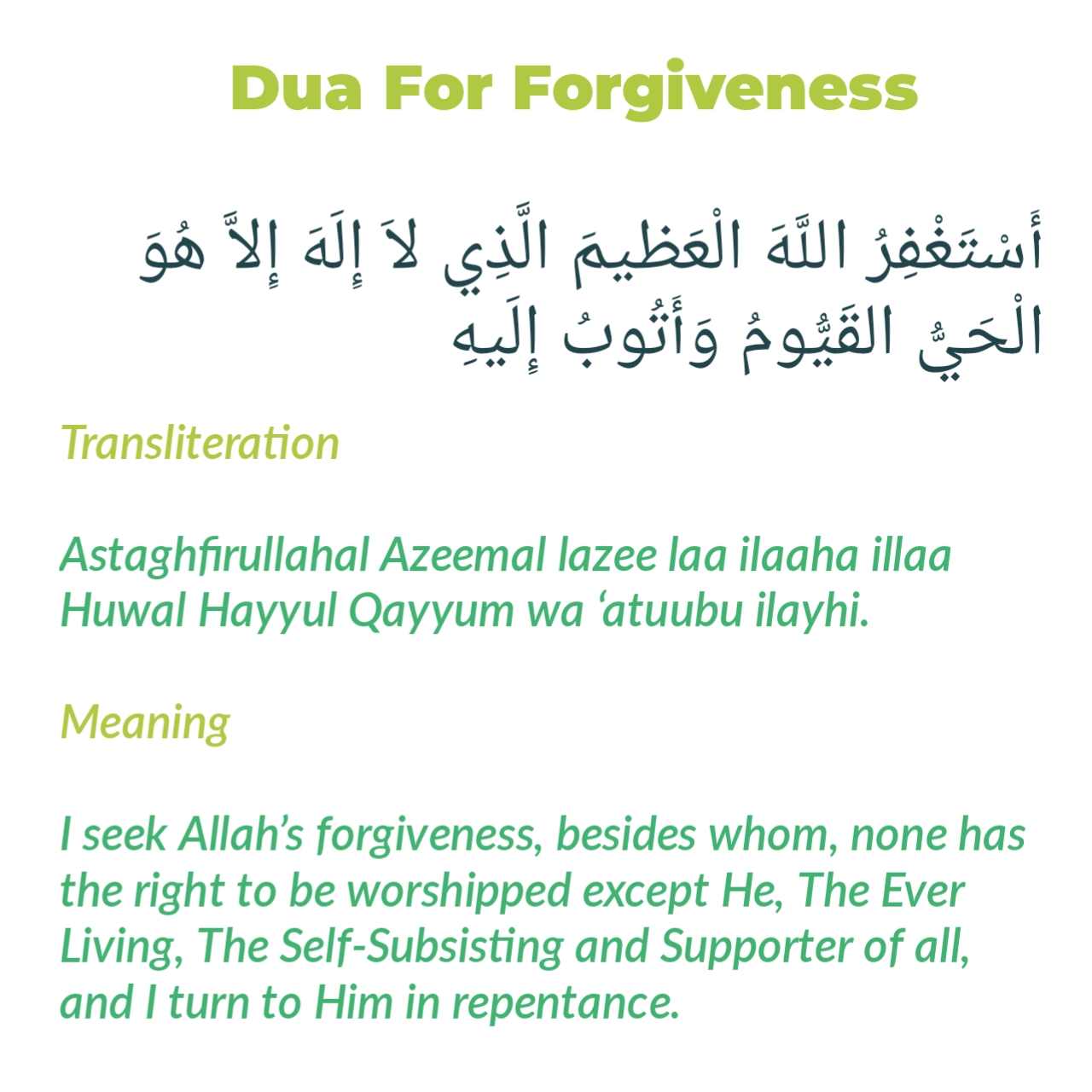

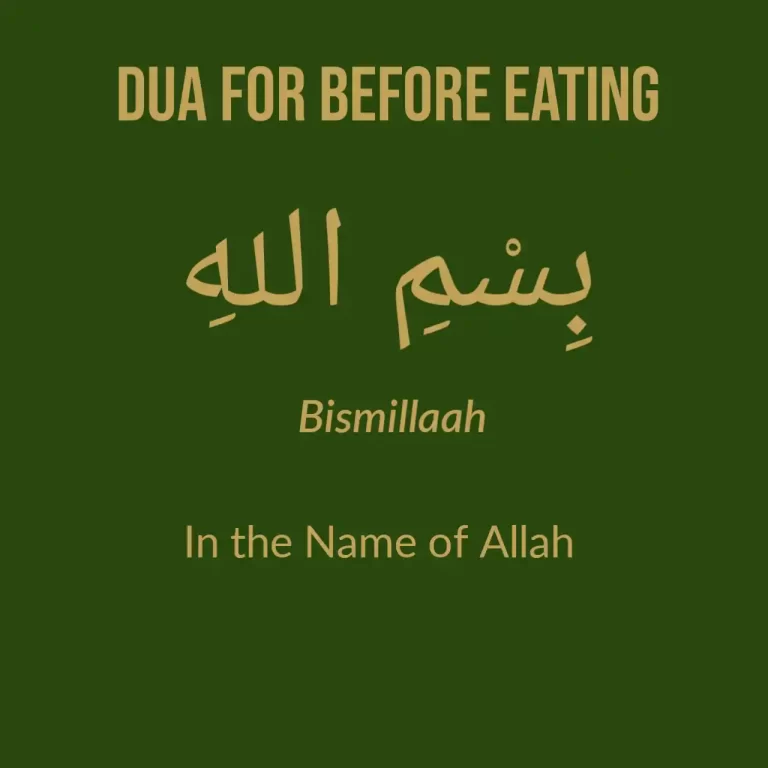
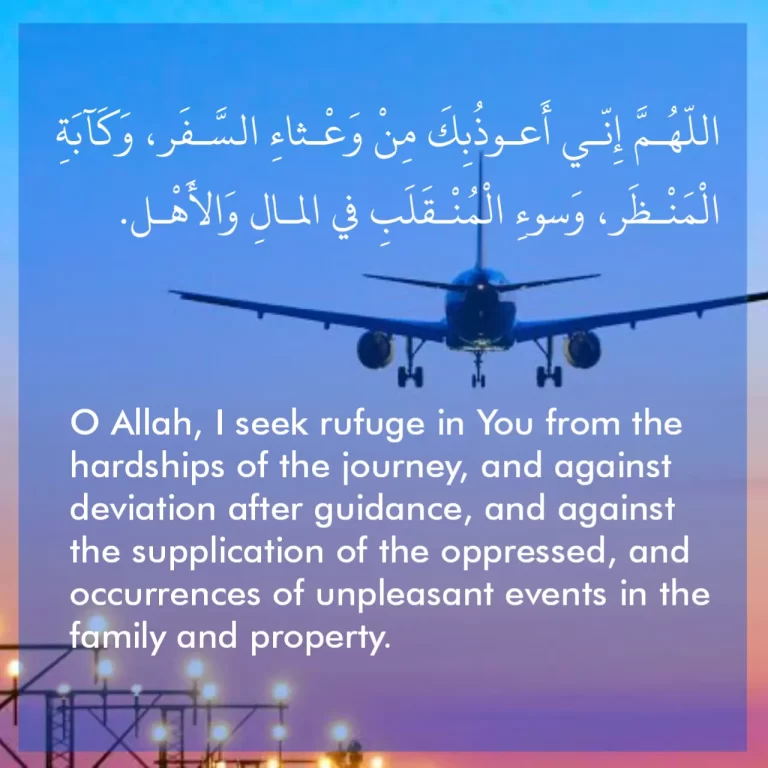
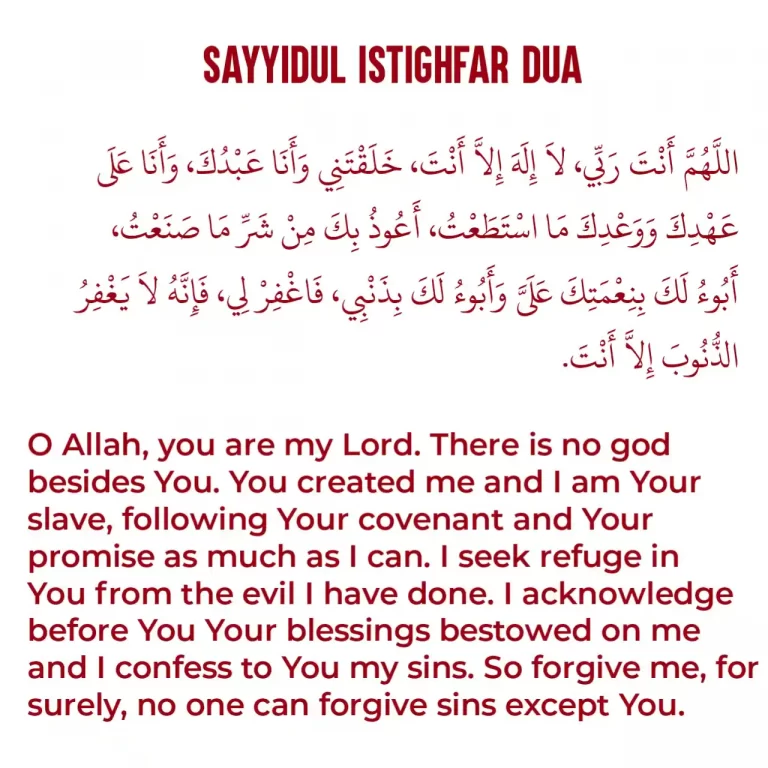

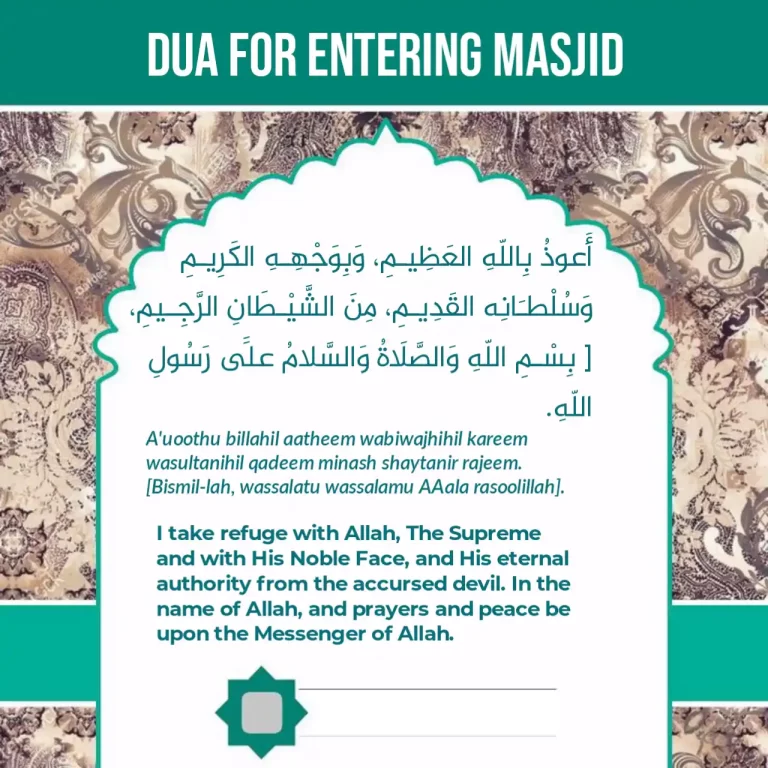
3 Comments